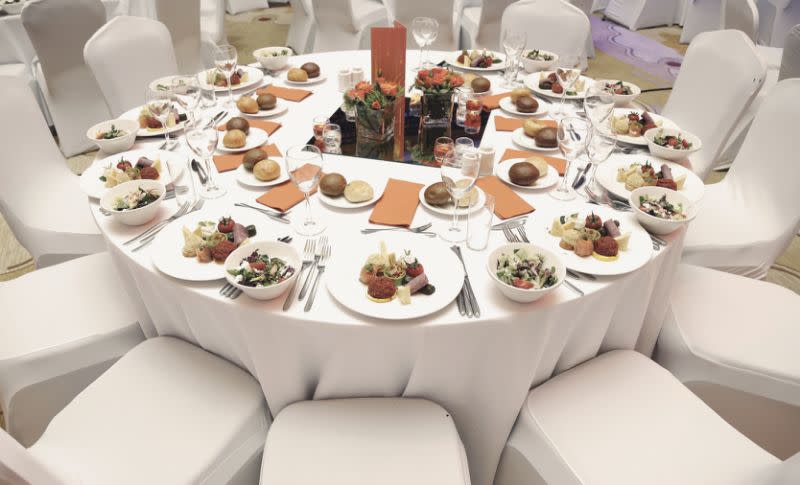Poor hygiene practices found after spate of mass food poisoning cases: NEA

The National Environment Agency (NEA) will take enforcement actions against three food establishments for lapses in hygiene practices and failure to maintain food safety which caused the recent spate of mass food poisoning across Singapore.
In a joint media statement by the agency, the Ministry of Health (MOH) and the Agri-Food and Veterinary Authority of Singapore (AVA) on Friday (14 December), the three authorities said that they have completed investigations into the three separate incidents that were traced to Mandarin Orchard Hotel, FoodTalks Caterer & Manufacturer and Tung Lok Millennium Pte Ltd.
Based on their investigations, there are no links among the three incidents that caused mass outbreaks of gastroenteritis, or inflammation of the intestines.
The incidents were also not linked to the salmonellosis outbreak traced to Spize Restaurant in an earlier food poisoning incident which led to the death of a Sats officer after he ate food prepared by the eatery. NEA has terminated the licence of the restaurant’s River Valley branch.
315 cases linked to Mandarin Orchard
In the most recent case of mass food poisoning traced to a banquet kitchen at Mandarin Orchard Hotel, a total of 315 cases were reported to have developed gastroenteritis symptoms after attending five separate events held at the hotel’s Grand Ballroom between 1 and 3 December. Thirteen of the 14 hospitalised cases have been discharged, with the remaining case in stable condition.
The three authorities said its investigations suggest an outbreak of norovirus gastroenteritis, with strong evidence of severe contamination of the hotel’s Grand Ballroom from poor environmental and personal hygiene practices. Norovirus is a common virus that causes gastroenteritis and can spread easily from contaminated food or surfaces.
The banquet kitchen serving the ballroom was suspended on 5 December, and interviews with staff revealed that there was “improper cleaning of vomitus in the Grand Ballroom, and banquet servers had continued to work while ill”.
Environmental swabs collected from the Grand Ballroom also detected norovirus from environmental surfaces such as carpet, tables, chairs, unused table cloths, cutlery and drinking glasses. In addition, faecal coliforms bacteria were detected in the food sample, while another bacteria, Bacillus cereus, were detected from various environmental swabs, such as those taken from the surfaces of utensils and door handles.
Poor kitchen habits at FoodTalks
In the incident related to FoodTalks, 131 cases were reported to have developed gastroenteritis symptoms after eating food prepared by the Bedok North catering firm during a pre-school day camp on 26 November. No one was hospitalised.
Investigations on 27 November found several hygiene lapses and poor kitchen habits, including lack of proper segregation between raw and ready-to-eat food in the same chiller compartment; use of the same preparation table for raw food and ready-to-eat food items; evidence of cockroach infestation; and preparation of ready-to-eat food items one to two days before consumption.
While the exact causative agent could not be identified, the short period from consumption of the food to development of symptoms, and the predominant symptom of vomiting among the patients, suggest that the outbreak was likely due to ingestion of toxins produced by bacteria in the food.
Tung Lok’s licence suspended
In the third food poisoning incident, 190 cases were reported to have developed gastroenteritis symptoms after consuming food prepared by Tung Lok Millennium during an event at the Singapore Expo held between 19 and 21 November. None of the cases were hospitalised.
The caterer’s operating licence was suspended after the joint inspection conducted by
MOH, NEA and AVA on 23 November. Several hygiene lapses and poor kitchen habits were identified, including no provision of soap for hand-washing and improper use of ice dispensing utensil for ready-to-eat ice.
An environmental swab taken from the bento packing table tested positive for the Bacilus cereus bacteria. Based on the predominant symptoms of diarrhoea and abdominal pain without fever, the pathogen involved is unlikely to be related to any of other three outbreaks reported.
Checks stepped up at food establishments
The authorities will continue to place the implicated premises under close surveillance and work with them to improve their food hygiene practices. The suspension of the banquet kitchen at Mandarin Orchard Hotel, closure of its Grand Ballroom and the suspension of Tung Lok Millennium will continue to be in place until NEA is satisfied that the public health risks have been addressed.
NEA and AVA have stepped up checks on food establishments as the year-end festive season approaches. With more consumers dining out and ordering catered food, they remind all food operators that they must ensure that the food sold is prepared hygienically and safe for consumption.
NEA has also engaged key representatives from the Association of Catering Professionals Singapore (ACAPS) and the Restaurant Association of Singapore (RAS) about the importance of food hygiene and safety. In addition, NEA and AVA advise all food operators and consumers to practise good food and personal hygiene.
NEA will also continue to review the overall regulatory framework, including the current penalty regime, to strengthen accountability of operators and ensure that food establishments take greater responsibility for the hygiene standards of their premises and operational processes.
Related stories:
175 ill in mass food poisoning linked to events at Mandarin Orchard Hotel ballroom
131 fall ill in third mass food-poisoning case this month
NEA suspends licence of Tung Lok Catering at Singapore Expo after reports of illnesses



